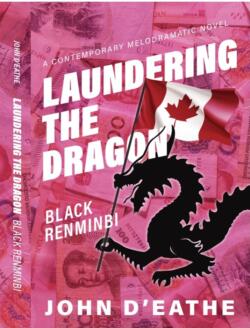1915 Money laundering and melodrama
Laundering the Dragon–Black Renminbi
By John D’Eathe
Vancouver: Adagio Media, 2021
$17.99 / 9781999433918
Reviewed by Valerie Green
*
 John D’Eathe has written what is described as “a contemporary melodramatic novel” set in recent times about a current day problem in the powerful, international financial business world.
John D’Eathe has written what is described as “a contemporary melodramatic novel” set in recent times about a current day problem in the powerful, international financial business world.
D’Eathe begins his book with an epigraph of a Chinese proverb—“Crony capitalists and crony communists will one day fire up a Dragon”—and starts his story with the disappearance and possible murder of a man called Wong Mai Fu, a Vancouver nightclub owner, and brother of Maisie Leyland (born Wong Mai Xi). She’s the wife of Ron Leyland, a Vancouver businessman from a prominent, very wealthy family.
The idea behind this crime novel is a good one. The concept of intermingling power, romance, crime, and dubious money laundering from Macau and China into Canada as a hard-boiled, lighthearted novel is an excellent scenario. Unfortunately, however, it gets a little off-track with the introduction of a plethora of different characters in every chapter (which made me glad the author had placed a list of all the main characters at the beginning of the book). As a reader and reviewer, I found myself constantly consulting the list—or else, I would have been even more confused by who exactly was who.
Further, the background history of every new character introduced into the story is described in detail and this takes the reader away from the original topic of what exactly has happened to Wong. I frequently wanted the author to return to the investigation into Wong’s disappearance. These backstories are told in a rambling way that can grow hard to follow.

The author begins with Ron Leyland pondering how his family could “have been so easily seduced by unethical foreign currency and why they had become involved with the wrong people?” Leyland deduces that it had all started with Leaky Condos in Vancouver: “Ron, not long out of college in the 1980s, had taken over Leyland’s small real estate division.” On a business trip to China, he first met Wong and consequently Wong’s sister Mai, who fascinated him. The relationship delayed his departure and “launched him on a wild lifetime of intrigue.
Renminbi, the People’s currency in China, together with the Chinese Yuan, are interchangeable terms for China’s currency. In D’Eathe’s novel Black Renminbi is weaving its way into the Western World. Money laundering gained prevalence in Canada, and the Vancouver Model–that involves, gamblers, casinos, and suitcases of currency—became the international money launderers’ standard for criminal activities. Leyland, like many other businessmen, was fascinated by the idea of quickly becoming even more wealthy.
D’Eathe soon introduces RCMP Assistant Commissioner Jack Jackman in Ottawa, and hints throughout the story of the slow and bumbling way the RCMP work a case: “Wong’s present-day disappearance had caused a bulging file labelled ‘Wong Mai Fu’ delivered to the desk of Jack Jackman.” The author goes on to say that Jackman did not open the file immediately but “leaned back and closed his eyes in recollection.” He was remembering his own pleasant time spent on the streets of Hong Kong but finally his memories return to Wong and of a criminal known as Zhang, followed by yet another side story about the man Jackman describes as “that bugger Zhang.”
D’Eathe manages to weave into his plot many similar side stories of corruption. Still uneasy, Ron becomes involved in the process, never completely understanding what he was getting into; meanwhile, his wife Mai XI (now known by her Canadian name Maisie Leyland) has become an activist in Canada against this criminal enterprise. She tries to control her brother and help him escape from the powerful investor, Zhang. Maisie’s friendship with Ah-Cy is yet another complication in what is already a very complicated story.
For me, this tale could well have been better told as a straight-forward crime novel with far fewer characters and back stories involved. Explanations for each character were indeed needed but perhaps in a less long-winded manner. Nonetheless, Laundering the Dragon is a promising attempt at a self-published, debut novel of note. I especially enjoyed the inclusion of many Chinese proverbs throughout the story, which added greater context.
D’Eathe studied law and urban land economics the UK. He had an adventurous business life in Colonial Hong Kong before moving to Canada to begin a career in major property investment and development around the world and in West Vancouver where he now lives. He obviously knows his chosen topic well.
*

Valerie Green was born and educated in England where she studied journalism and law. Her passion was always writing from the moment she first held a pen in her hand. After working at the world-famous Foyles Books on Charing Cross Road, London, followed by a brief stint with M15 and legal firms, she moved to Canada in 1968 where she married and raised a family, while embarking on a long career as a freelance writer, columnist, and author of over twenty non-fiction historical and true-crime books. Her debut novel Providence has recently been published by Hancock House as the first of The McBride Chronicles, an historical four-generational family saga bringing early BC history alive. Now semi-retired (although writers never really retire!) she enjoys taking short road trips around BC with her husband, watching their two beloved grandsons grow up and, of course, writing. [Editor’s note: Valerie Green has recently reviewed books by Bruce F.B. Hall, Jeanette Taylor, C. C. Humphreys, Anna Pitoniak, Louise Carson, Michael Kluckner, Jennifer Manuel, and Barbara Smith for BCR.]
*
The British Columbia Review
Interim Editors, 2023-24: Trevor Marc Hughes (non-fiction), Brett Josef Grubisic (fiction)
Publisher: Richard Mackie
Formerly The Ormsby Review, The British Columbia Review is an on-line book review and journal service for BC writers and readers. The Advisory Board now consists of Jean Barman, Wade Davis, Robin Fisher, Barry Gough, Hugh Johnston, Kathy Mezei, Patricia Roy, Maria Tippett, and Graeme Wynn. Provincial Government Patron (since September 2018): Creative BC. Honorary Patron: Yosef Wosk. Scholarly Patron: SFU Graduate Liberal Studies. The British Columbia Review was founded in 2016 by Richard Mackie and Alan Twigg.
“Only connect.” – E.M. Forster
5 comments on “1915 Money laundering and melodrama”